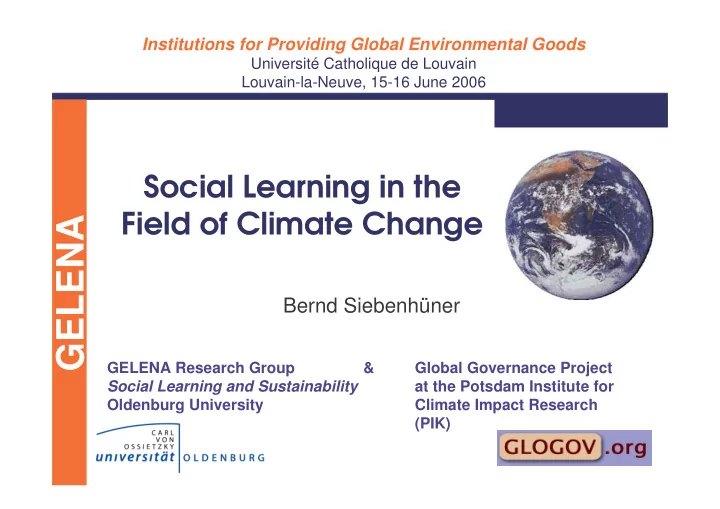

Institutions for Providing Global Environmental Goods Université Catholique de Louvain Louvain-la-Neuve, 15-16 June 2006 Social Learning in the Field of Climate Change GELENA Bernd Siebenhüner GELENA Research Group & Global Governance Project Social Learning and Sustainability at the Potsdam Institute for Oldenburg University Climate Impact Research (PIK)
Climate change as a global „bad“ � Certain facts Source: IPCC 2001
� Uncertain future Source: IPCC, 2001: Summary for Policy Makers, Working Group I, Geneva 2001, p. 14
Climate change as a global „bad“ � Persistent uncertainties: � Unpredictability: � Human behaviour � Chaotic systems � Political processes � Structural uncertainties: � Incomplete or inadequate models � Dispute over model structure � Ambiguous system boundaries � Value uncertainties: � Incomplete or imperfect observations � Inappropriate spatial or temporal resolution � Incomplete knowledge on policy options and technical solutions
Preference formation towards climate change � Individual and collective preferences formed under threat of uncertainties � Preference formation often oblivious of available knowledge (likelihood of extreme weather events, temperature rise etc.) � Myopic formation of preferences � No revelation of real preferences because of public-good problem � Biased decision making on domestic and international levels � Social learning as response strategy?
What is social learning? � Who learns? � Societies at large � Social actors: citizens groups, corporations, non-governmental organisations, international organisations, scientific bodies � Following case study: scientific assessment body � What counts as learning? � process in which individual or social actors acquire knowledge that leads to a change in their behaviour in a certain direction � What kind of things are being learned? � Procedural knowledge � Substantial knowledge, e.g. scientific findings, new solutions etc.)
Towards a conceptual framework • Borrowing from organisational learning in management studies: • OL is based on individual learning • Changes in the “instrumental theory-in-use” (norms, strategies, assumptions) mark OL • Structural, cultural, personal and external factors count • Distinction between different types of learning
Single-Loop Learning (Argyris/Sch � n 1978/1996) ���������� ���������� ������� ����������� ������� ������������� ����������
Double-Loop Learning (Argyris/Sch � n 1978/1996) ���������� ���������� ������� ����������� ����������� ������� ������������� ����������
Forms of Learning � Adaptation: � changes in behaviours result from induced changes through external processes that do not include changes in the cognitive framework of the organisation and its members � Reflection: � change in the prevalent knowledge structure including the prevalent cognitive frame
Case study: Intergovernmental Panel on Climate Change � Goals of learning: � Saliency � Credibility � Legitimacy -> Scientific assessments learn when they change the way the assessment is conducted in order to become more salient, credible and legitimate or when participants acquire general abilities to conduct more salient, credible and legitimate assessments which are founded on changes in knowledge and beliefs
Social learning at the science- policy interface Assessment process Policy / negotiation process Formation and Reduction of Policy Criteria: revelation of uncertainties on: outcomes • Saliency preferences: • Causes and • Credibility • Opinion effects • Legitimacy formation • Facts and • Interests prognosis • Pressures • Solutions and • Promotions of policy options policy options
Science-policy interface ������������ �� !�����������������" at the UNFCCC ���������� �������� ��������� (&) ����������$�������� �����!�����!�����" &��'�� � ���!� �����������%���� ���� !�������� ����������$�!������� ���������#����� �������#���$�������� %��'�� � ���!���!���� ������������ �� ������� �������#�����������" Source: Based on Alfsen & Skodvin 1998
IPCC‘s First Assessment Report (1988-1992) � Climate change as fundamental problem with high uncertainties � Revolutionary set up of the intergovernmental approval mechanism [reflection] � Few rules of procedure � Increasing awareness of the lacking involvement of Southern scientists � Moderate credibility � Moderate legitimacy � High saliency
Second Assessment Report (1992-1995) � „Discernible human influence on climate change“ � Task Force on the IPCC Structure � New set of rules of procedure (refined review process) [adaptation] � Increased credibility � Increased legitimacy � Moderate saliency
Third Assessment Report (1995-2001) � Findings on first actual impacts (changing habitats, migration patterns) � Chapter-8 debate changed mind sets towards more legalistic ways of thinking [reflection] � Refined rules of procedure (3-level review process) � High credibility � Moderate legitimacy � Reduced saliency
Fourth Assessment Report (2001-2007) � Estimates of higher temperature rise � New guidance on uncertainties [adaptation] � High credibility � Moderate to high legitimacy � Moderate saliency
Discussion � Reflection triggered by external criticism � Adaptation demonstrate general ability to change � Supportive factors: � Existence of a small and well-connected group of individuals in the Bureau � Inclusive communication and decision-making structures � Existence of functional mechanisms for learning and change, such as task forces, review process, white papers � Political influence?
Policy and assessment process 1995 1988 1990 1992 1997 2001 2002 2005 2007 US UNFCCC Kyoto‘s entry leaves signed into force Kyoto Policy Kyoto Protocoll signed process Johannisburg ? summit ? ? IPCC founded Supplementary Assesment report SAR TAR process 1 st report conducted conducted [Adaptation] [Reflection] [Adaptation] [Reflection] [Reflection] [Adaptation] [Reflection] 1 st AR 2 nd AR 3 rd AR 4 th AR
Thank you!
The Underlying Study � Analysis of learning processes in the scientific assessments of the IPCC � Empirical basis: expert interviews in 2001 � Part of the Global Environmental Assessment Project (http://environment.harvard.edu/gea) � See Siebenhüner, B., 2002. How do scientific assessments learn? Parts 1 & 2. Environmental Science & Policy , Vol. 5 (2002)
Recommend
More recommend